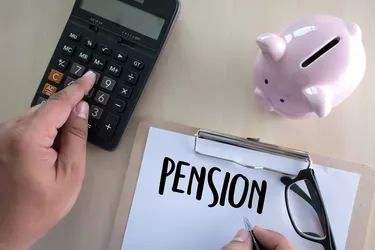
Termination from your job usually includes cleaning out your desk, turning in your company equipment and being walked out the door. It may be only after you get home you remember you have quite a bit of money in the company pension fund. A federally mandated program, Employee Retirement Income Security Act (ERISA) protects you from losing your pension even if you are fired.
Tip
You may cash out your pension plan if you're terminated from your job, but you may also have to pay a penalty for early distributions unless your plan has an early cash-out clause or unless you roll over your pension funds to another plan such as an IRA.
Video of the Day
ERISA Protection for Pensions
Your pension is protected through ERISA regardless of why you were let go from your job. The program is in place so you can retire at the appropriate age and collect your pension from former companies, even if you have been gone for years. Pensions are retirement benefits provided by your employer.
Video of the Day
Early Pay Out
Some companies set the pension program up to allow for an early cash out. Companies not interested in tracking and managing the pension funds of fired employees may find it easier to let the terminated worker take the money with him when he leaves. In other cases companies may offer terminated workers some choices. The terminated employee can cash out the plan or he can choose to leave it where it is until he retires.
Vested Pension Plans
If you work with a company that has a vested pension plan, whether you can cash it out upon termination depends on whether you are vested at that point. Vesting is earned by working for the company for a pre-determined time. For example, your company agreed to match your pension fund contributions from your paycheck. The company standard is after two years employment you are 50 percent vested, at three years you are 75 percent vested and at five years your are 100 percent vested.
If you are terminated at the three year mark and cash out your pension you will receive your contributions plus 75 percent of the money your company contributed. If you are terminated before the two years has passed, you will only receive your contributions back.
Pension Plan Penalty Options
You will be penalized if you cash out your pension plan early. A better option may be to roll the funds into an IRA plan. This option eliminates any financial penalty for removing the money from your former company.
Penalties for cashing out and not rolling it into another plan can be as high as 10 percent if you are younger than age 59 1/2. There is no penalty if you are older than age 59 1/2 when you withdraw the funds. Employers must withhold 20 percent as income tax, therefore a person under 59 1/2 who does not roll the funds over could face a 30 percent combined tax and penalty.